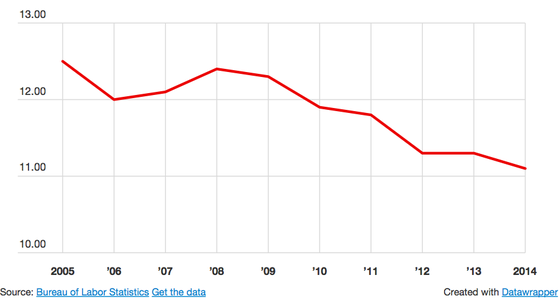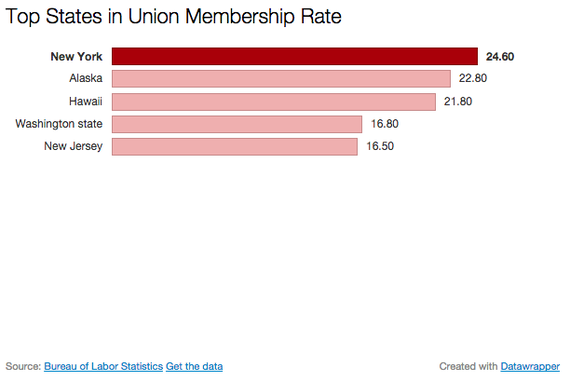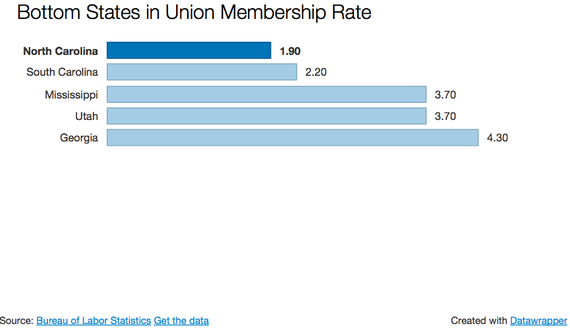Connecting state and local government leaders
The national membership rate fell again in 2014 even as job growth surged to a 15-year high.
Last year may have been a banner year for job creation in U.S., but it was not a banner year for unions. The percentage of union members among workers nationwide dropped to a new low of 11.1 percent in 2014, extending a decades-long decline for the labor movement.
For union supporters, the new data released Friday by the Labor Department tells a familiar but dispiriting story that illuminates the national debate over slow wage growth and income inequality. A generational shift in the labor market that eliminated U.S. jobs in union-dominated industries has been exacerbated in recent years by assaults on public-sector unions in Republican-led states like Wisconsin, Michigan and Indiana.
Yes, the U.S. created some 3 million jobs in 2014—the most since 1999—but too few of them paid well, and those that already had jobs saw little increase in their salaries. "That's a fundamental consequence of the inability of workers, through collective bargaining, to negotiate for higher wages as the economy improves," Larry Mishel, president of the left-leaning Economic Policy Institute, said in an interview Friday. Or, as Jonathan Schmitt of the Center for Economic and Policy Research told The Wall Street Journal: “The overall workforce is growing faster than the union workforce."
In 1983, the first year the Bureau of Labor Statistics conducted its annual survey, the union membership rate was 20.1 percent. By 2004, it had fallen to 12.5 percent, and with the exception of a slight bump in 2006 and 2007, it has slipped even more since. The plunge has been steepest in the private sector, where mid-20th century union members comprised more than one-third of the workforce. That rate has dropped all the way to 6.6 percent after falling again in 2014. The percentage of unionized public employees actually ticked up, to 35.7 percent, but the much faster growth in private jobs during the economic recovery helps explain why the overall union membership rate has declined.

In a response to the report, AFL-CIO President Richard Trumka did point to a few bright spots. Membership rates grew among the youngest workers (although the highest percentages are still found among employees closer to retirement). And membership rose among Latino men, African-Americans, and Asians, as well as in the leisure and hospitality industry. Among the states, New York continued to lead with nearly a quarter of its workers unionized, while some states in the south had barely any union membership at all. In two states—Wisconsin and Michigan—that passed "right-to-work" laws making it harder for unions to organize, the union membership rate fell significantly, while it actually rose slightly in a third state, Indiana.


Despite their shrinking membership rolls, labor unions remain powerful political forces both nationally within the Democratic Party and even more so in big cities. "The labor movement is still winning elections," noted Gene Carroll, director of Cornell University's Union Leadership Institute. And, he noted, the labor movement has finally entered a needed period of introspection and retooling. But as states and municipalities slashed budgets during the Great Recession, contract negotiations that focused largely on how much unions would have to give up also sapped the allure of a union job—better pay and solid benefits. "Workers will say, 'Gee, can labor win?'" Carroll said.
With the decline in membership rates continuing even in a good year for the economy, the more pertinent question is, will the labor movement's plunge ever bottom out?



